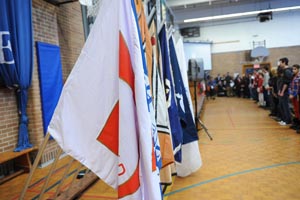 Our gym has been adorned this week with 20 flags from various Round Square member-schools attending the Junior Round Square Conference. Most participating schools are from Canada, the USA and South America. However, some are from as far away as Denmark, South Africa, and Singapore. The flags are symbols of difference and diversity in schools in different countries with unique histories, cultures, languages and orientations.
Our gym has been adorned this week with 20 flags from various Round Square member-schools attending the Junior Round Square Conference. Most participating schools are from Canada, the USA and South America. However, some are from as far away as Denmark, South Africa, and Singapore. The flags are symbols of difference and diversity in schools in different countries with unique histories, cultures, languages and orientations.
A core objective of both LCC and the Round Square is to open students’ eyes to the broader world and create a sense of comfort with diversity and a genuine interest in developing an international perspective. This requires a focus on language skills, an appreciation of cultural traditions, as well as an awareness of key international historical and current events.
I cannot emphasize enough how important it is for each of our students to seek to know more about diversity at home and abroad. If education can be looked at as a tool kit, every student needs the tools to be a craftsman for success in the future. In addition to a comfort and interest with diversity, each needs another important set of tools: an awareness of major events in the world and major international trends and current events. Our world has become completely entangled and interdependent. We all need to be informed and take positions on a host of issues well beyond our back doors. For teenagers, there’s no time for “duck and cover” or avoidance because the issues are too complicated, and the world will catch up to them.
This past weekend we all saw amazing images and footage of the culmination of a people’s revolution in Egypt; swarming throngs of everyday people demanding their voices be heard after 30 years of living under conditions of virtual martial law with very limited personal freedoms. The resilience of the street protestors reflected a fantastic example of the depth of the desire for democracy. The events in Egypt send a powerful signal to other countries that have never had a democratic tradition.
Consider for a moment, what the impact will be on many other old monarchies and strongmen in the region of the Middle East & North Africa. Already since the weekend and the resignation by Egyptian leader Hosni Mubarak, people in Tunisia, Yemen, Bahrain and Iran have openly protested in the streets even though their governments frown on it. In several other countries without democratic traditions, rulers are nervous.
Note that authorities in those places did everything in their power during the past three weeks to make sure that their citizens could not witness the elation of the ecstatic freedom street dance in Cairo. In those authoritarian countries, state-run television refused to show the images of the Egyptian street protest and, in Iran in particular, Persian-language BBC International was scrambled to prevent the flow of information. State control and limitations on the Internet and cell phone networks have also prevented the sharing of images and ideas from Egypt.
But you know as well as I do that governments cannot shield their people from the truth. In this day and age, the images and information will eventually surface. They will surely see the images of the Egyptian peoples’ democracy dance, just as the Chinese people did following the events in Tiananmen Square in Beijing the late 1980’s.
So how do the events in Egypt impact relations with Israel? What are the broader implications for the region? What is Canada’s role in all this?
Students may have no idea how to approach these complicated questions – and if they’re in grades 7, 8, and 9, that’s probably excusable. However, if they’re in grades 10, 11 and certainly Pre-U, I believe they should take a view, form an opinion, and quite simply, care. Our times mandate it.
So I offer students this simple piece of advice: pay attention to world events or risk being marginalized in the long term. So maybe we all should take a fresh look at those diverse flags again in our gym and see them as a starting point. Interesting, aren’t they?! —Chris Shannon, Headmaster
